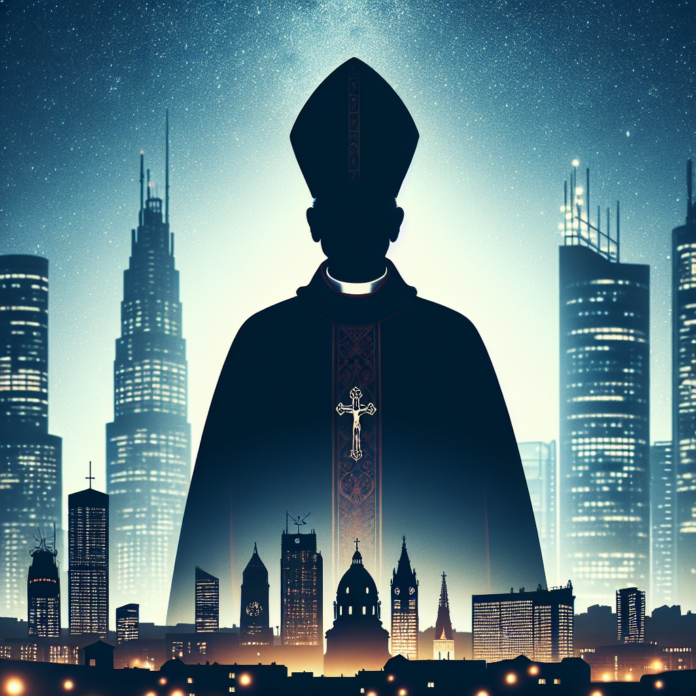Cardinal Robert Sarah: A Traditional Figure Misaligned with Modern Europe
Cardinal Robert Sarah, often viewed as a herald of staunch traditionalism within the Catholic Church, stands in many ways at odds with the contemporary spirit of Europe. His teachings and positions shine a spotlight on the friction between the Church’s conservative factions and the modern, progressive values that many consider essential for navigating today’s socioeconomic realities. The tension becomes particularly stark when juxtaposed with the more inclusive and forward-thinking approach advocated by Pope Francis.
Born in Guinea in 1945, Cardinal Robert Sarah has had a distinguished ecclesial career, rising through the ranks to become Prefect of the Congregation for Divine Worship and the Discipline of the Sacraments—a position he held until his retirement in 2021. His tenure was marked by vocal defenses of traditional Catholic practices, including the Latin Mass and a conservative interpretation of Church doctrine.
In Europe, a continent striving for inclusivity, pluralism, and social justice, Sarah’s conservative vision often appears discordant. At a time when the European Union grapples with issues like migration, gender equality, and climate change, Sarah’s positions frequently align him with an older, less adaptable worldview.
One of the cardinal’s most contentious stances has been his advocacy for the Latin Mass, a liturgical form that many see as anachronistic. The Latin Mass, or the Tridentine Mass, was the standard for Catholic liturgy until the reforms of the Second Vatican Council in the 1960s, which aimed at making the Mass more accessible and understandable to the lay faithful. Pope Saint John XXIII and his successors believed that allowing the vernacular languages in the liturgy would better engage the global congregation. In stark contrast, Sarah has championed a return to the older form, arguing that it preserves the sacredness and mystery of the Eucharist.
For many contemporary Catholics, particularly those in Europe, the Latin Mass is seen as exclusionary. It harks back to a time when the Church’s hierarchy was less transparent and less responsive to the needs of ordinary believers. Today, a considerable number of Catholics appreciate the reforms initiated by Vatican II, which made worship more participatory and less clerical. Sarah’s insistence on the Latin Mass can thus come across as a step backward rather than forward.
Moreover, Sarah’s strong opposition to progressive movements within the Church places him at odds with many European Catholics. For example, he has been a vocal critic of the movement towards greater inclusion of LGBTQ+ individuals within the Church. While European society has increasingly embraced LGBTQ+ rights, seeing them as integral to human dignity and equality, Sarah has maintained that the Church’s teachings are immutable and must stand against what he sees as societal degradation.
Pope Francis, in contrast, has taken steps toward a more inclusive Catholicism, famously stating, "Who am I to judge?" regarding LGBTQ+ individuals. His pastoral approach has been to open doors rather than close them. Pope Francis’s nuanced understanding of the complexities of modern life offers a stark counterpoint to Sarah’s more rigid interpretations of Church doctrine.
The tension between Sarah’s brand of traditionalism and the more progressive currents in European Catholicism can also be seen in social issues like migration. Pope Francis has persistently emphasized the need for compassion and support for migrants and refugees, urging European nations to open their doors to those fleeing war, persecution, and poverty. Cardinal Sarah has been less vocal about this issue but has indicated a more cautious approach to migration, reflecting the concerns of some conservative factions that prioritize cultural and security issues over humanitarian considerations.
This reluctance to embrace a more open policy on migration reflects a broader conservatism that often finds little resonance in Europe’s current socio-political climate. The 21st century has brought with it a recognition that humane responses to crises require adaptability and a willingness to embrace new paradigms—qualities that Sarah’s brand of traditionalism often lacks.
Cardinal Sarah’s perspectives, therefore, encapsulate a form of Catholic conservatism at odds with many of Pope Francis’s initiatives. This dissonance is not merely doctrinal but extends to how the Catholic Church positions itself in a rapidly evolving world. The contrast between Sarah’s and Francis’s approaches highlights an underlying struggle within the Church between a nostalgic traditionalism and a future-oriented dynamism.
In sum, Cardinal Robert Sarah embodies a form of Catholic traditionalism that frequently clashes with the contemporary values prevalent in modern Europe. His advocacy for the Latin Mass, his rigid stances on social issues, and his cautious approach to migration all demonstrate a reluctance to engage with the progressive currents of our time. In an era when inclusivity, adaptability, and social justice are paramount, figures like Pope Francis offer a compelling counter-narrative to the conservative strains embodied by Cardinal Sarah. As Europe continues to strive toward a more inclusive and equitable society, it finds itself increasingly at odds with traditionalist voices within the Catholic Church that seek to tether it to its past rather than guide it forward into a more hopeful and inclusive future.
